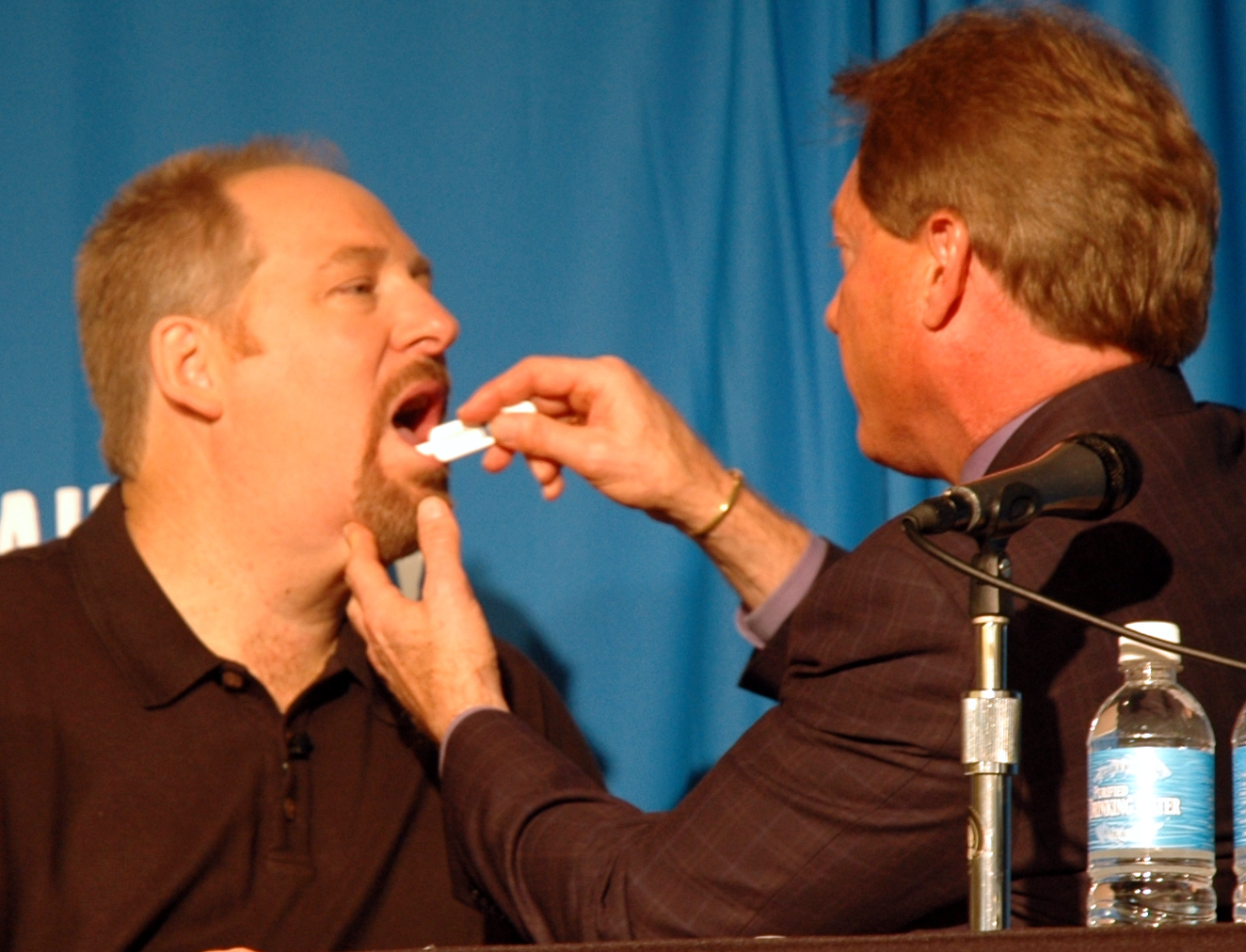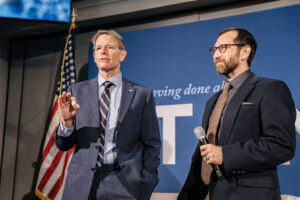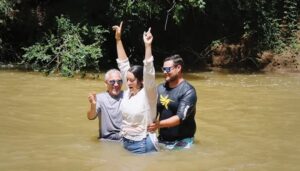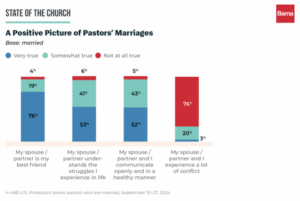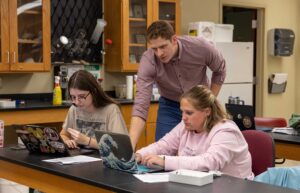
LAKE FOREST, Calif. (BP)–In the background were larger-than-life photos of countless faces of people in varying stages of suffering — white, African and Asian people — in groups, or suffering alone on a bed, or up close with their tender eyes crying out for help.
On the platform, one after another, came politicians, scientists, public health officials and a pastor and his wife.
Rick and Kay Warren of Saddleback Church have spent the past three years preparing for this day, when nearly 1,700 people from 37 states and 17 countries joined forces to repent, to pray, to teach and to show God their commitment to fight the global HIV/AIDS crisis.
In what Kay Warren called “a wakeup call and a kick in the butt,” the HIV/AIDS “Disturbing Voices” conference at Saddleback in Southern California sought to break the stigma of AIDS and set the pace for the HIV testing and treatment.
With 54 speakers in plenary sessions and workshops, the Nov. 29-30 conference was billed as a local church-based gathering to mobilize congregations all over the world to address HIV/AIDS prevention and treatment. The conference was cosponsored by Saddleback and the Chicago-area Willow Creek Community Church.
Special events to honor World AIDS Day on Dec. 1 followed the two-day conference, including a special prayer service, community service projects led by Saddleback small groups, a free concert headlined by Wynonna Judd and several Christian artists, and free HIV testing.
At a press briefing on World AIDS Day, Rick Warren was publicly tested to see if he had the virus. “I am taking this test publicly so that we can start the process of reducing the stigma related to just being tested,” Warren said.
The results were negative. “That deserves a kiss,” his wife celebrated.
Birthed in her heart three years ago, Kay Warren said her own journey into AIDS awareness began with a magazine article that shocked her with statistics and photographs.
More than 25 million people have died from the aggressive disease, which has ravaged Africa, India and China, largely through heterosexual transmission, and continues to grow in the United States, largely through homosexual encounters.
Worldwide, a reported 40 million people have HIV/AIDS, but David Miller disputes this number.
“We believe that there are 75-80 million people infected with the disease,” Miller, of the radical homosexual activist group ACT-UP in New York, said.
Since finding out in 1988 that he was HIV-positive, Miller has been a caustic protester for AIDS causes, including the militaristic storming of New York City’s St. Patrick’s Cathedral in December 1989 and Washington, D.C.-area’s National Institutes of Health in May 1990.
Miller is married and his wife also has the disease.
The Warrens befriended Miller in their attempts to understand the enormity of the disease. For Miller, it’s the first time that Christians have listened to him.
“I have never been to a conference with so many HIV-negative people,” Miller marveled. And when Saddleback members welcomed — and hugged – more than 20 people with HIV/AIDS on stage during the conference’s closing session, he couldn’t believe that nobody ran away.
“I am not a Christian,” Miller said. “But I am thinking about it.”
In addition to its message of compassion, the conference sought to impart several other points emerging from Warren’s global P.E.A.C.E. plan.
Based on the Great Commission to make disciples (Matthew 28:18-20) and the Great Commandments to love God and to love our neighbors (Mark 12:28-34), the plan is Warren’s approach to attack what he calls the five “global giants” — spiritual emptiness, egocentric leadership, extreme poverty, pandemic diseases and illiteracy and poor education, by Planting churches, Equipping servant leaders, Assisting the poor, Caring for the sick and Educating the next generation.
Using the acrostic C.H.U.R.C.H., Warren enumerated six ways the church can best fight HIV/AIDS: Care and comfort the sick; Help test and counsel; Unleash a worldwide volunteer force; Remove the stigma; Champion healthy behavior; and Hand out medicine and nutrition.
Bill and Lynne Hybels of Willow Creek Community Church said the church must be a safe place where people can come to for healing and acceptance. The couple became engaged in the battle as a result of contacts with rock star Bono of U2.
“It’s not our place to ask how or why people contracted the disease,” Bill Hybels said. “It is our place to love them.”
“The Christian community has been silent far too long,” lamented Claude Allen, chief assistant to President George Bush for domestic policy, who urged the American church to “put their heart and their backs” into the effort of eliminating the disease.
“One hundred percent of this disease is preventable,” he said.
Robert Redfield, cofounder of the Institute of Human Virology at the University of Maryland and a physician with notable accomplishments in the area of HIV research, said the church is best positioned to combat the pandemic.
“This may be the ultimate Christian opportunity,” he asserted.
Jim Towey, assistant to President George Bush and director of the Office of Faith-Based and Community Initiatives, who formerly worked alongside Mother Teresa in India, shared about his involvement in the nurture and care of HIV patients.
“Government has the responsibility to provide for people, but there is a need much greater than material poverty,” Towey said.
Calling loneliness the most terrible disease, he emphasized that the government cannot minister to people who feel unloved and unwanted, but the church can.
Video messages from First Ladies Laura Bush of the United States, Janet Museveni of Uganda and Jeannette Kagame of Rwanda also emphasized the importance of engaging in the battle.
Harvard University’s Edward Green reviewed statistics of the disease’s progression and, in some cases, its prevention. Green’s study, completed in 2004, found that faithfulness and abstinence campaigns, in that order, played the most significant role in the dramatic reduction of AIDS in Uganda. These compose two of the three emphases in the “ABC” plan — Abstinence, Being faithful in marriage and Condoms only for high-risk populations — that Uganda has implemented since 1990 in its fight to rescue its country from HIV/AIDS. Green discovered that by 1995, 95 percent of Ugandans ages 15 to 49 were practicing abstinence or monogamy while just 6 percent of the population was using condoms.
Gary Haugen, president of International Justice Mission, a human rights organization based in Washington, shared his attempts to be a voice for the voiceless victims of sexual violence.
“Sexual violence is one of the engines that is driving the spread of the disease,” Haugen said, noting that 78 percent of HIV-positive sub-Sahara African women reportedly were forced to have sex.
“Gender is at the heart of the pandemic,” he declared, stating that rape, sex trafficking, and an unjust view of women have caused more women than men to die from HIV/AIDS.
Violence also affects the vulnerability of the victims through the violent dispossession of property of widows and orphans, Haugen said. “When the head of the household dies, other family members simply take the property and the home away, leaving the orphan and widow alone,” he lamented.
Several clergymen from various denominations added their voice of commitment to the cause.
Charles Blake, pastor of West Angeles Church of God in Christ in Los Angeles, started the nonprofit Save Africa’s Children organization to assist more than 90,000 African children affected by the AIDS pandemic. Blake told the conference, “I hope that we are inspired today to provide formal, deliberate opportunities and ministries to assure victims themselves will receive all the love, all the care, all the comfort that we can provide.”
Rwandan pastor Francis Karemera shared the heartbreaking story of his first wife’s battle with HIV. It was during their honeymoon that she first became sick.
“I am a pastor, a born-again Christian,” Karemera recalled saying to God. “The Lord does not allow for my bride to have HIV!”
Yet, within weeks, he learned his Christian wife was dying, something he thought also would end his profession as a pastor. After he lost his wife, he moved from Uganda to Rwanda, where he intended never to share the truth of his experience.
Later a part of the Anglican Diocese of Kigali, Rwanda, Karemera heard God’s call to share with those who are going through HIV/AIDS-related problems and to educate future generations about healthy behaviors that will prevent spread of the disease.
“In our culture, we carry our children on our backs,” Karemera said, illustrating the opportune time to teach children right or wrong. “It’s the best time to teach them to be thieves,” but how much better it would be “to teach them values,” the pastor said.
Martin Ssempa, pastor of Makerere Community Church in Kampala, Uganda, who called the pandemic “the genocide of HIV,” has effectively used educational entertainment as a means to communicate behavioral change to youth at Makerere University.
The effort, called Prime Time, has grown from 50 to 5,000 students since 1988 and has become a part of the university’s cultural landscape.
Ssempa said his ultimate goal is to celebrate an Abstinence Pride Month, “30 Days of Abstinence,” when men, women, children, parents and grandparents march together celebrating the healthy attitudes of abstaining from premarital sex and alcohol.
“Imagine the bumper sticker, ‘My daughter chose to be abstinent. I am so proud of her,’” he said energetically.
Kirbyjon Caldwell of Windsor Village United Methodist Church in Houston, encouraged churches to partner with healthcare providers in providing testing and counseling of AIDS patients.
But he offered a cautionary note: “If you are to launch an effective and efficient AIDS ministry, you need to begin to counsel your membership. Do not assume that your congregation will get it overnight.”
He added, “Do not be surprised when you come under attack.”
Acknowledging the stigma of AIDS in the local church, Kay Warren reminded, “It’s not a sin to be sick.”
“Most of us are in complete denial of our prejudices,” Warren said. “When [the enormity of AIDS] began to crash in on me, my next emotion I had to deal with was repentance. Not just bad attitudes. It was sin. I had to deal with it.”
Then came the acceptance, she said.
Once you move through those two issues, you then begin being the hands and feet of Christ, Warren explained.
Many times we “rush past the ache in someone’s soul. Frequently we rush past pain. That’s not the way Jesus treated us,” Warren said. “God brought His Son into the world when He saw the brokenness and despair.”
If we take God into our own lives and receive His Spirit, we “become containers of Him and wherever we go we take Him with us,” she said.
“This is my task and your task,” Warren said of bringing Christ’s presence into the lives of those with HIV/AIDS. “We have to put flesh on Him. By my actions I make Him visible.”
Her husband, who advocates repentance instead of avoidance, acceptance instead of intolerance, presence instead of distance, and endurance instead of superstition, concurred.
“If you are going to join this battle against HIV/AIDS, it has to start in the heart -– you have to care,” Rick Warren said. “One day you are going to be judged by how you treated other people. You may not be able to change the world, but you can change the world for somebody.”
–30–
With reporting by Kelli Cottrell.
